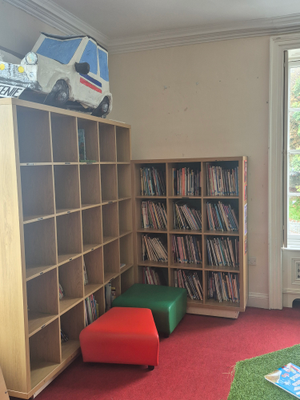Reading
Our Vision for Reading.
At Our Lady’s our vision is for all children to become fluent and effective readers who have a
deep love of reading.
INTENT
• We aim to foster a love of reading through a variation of text types, our teaching of
systematic phonics and opportunities to read aloud in groups and individually. Skilled
word reading involves both the speedy working out of the pronunciation of
unfamiliar printed words (decoding) and the speedy recognition of familiar printed
words.
• Through our teaching of reading comprehension we aim to develop key skills of
words reading, reading fluency and language understanding.
IMPLEMENTATION
Phonics
Through our Read Write scheme children will be taught the 44 sounds that make-up our
language. This is then utilised by the children to enable them to construct words
independently in spelling and to decode unfamiliar words in reading.
Reading
Children learn to read using the Read Write Inc scheme they then progress through Our
reading scheme books which are levelled using the Bookband Levels/Colours .Children
move through these levels until they reach Lime and then they become 'Free Readers’
choosing books from home and/ or class libraries. The children will move bookband/level at
the Teachers discretion.
Guided Reading
Children are encouraged to develop comprehension skills from the outset and as they
progress their reading, they are expected to develop a deeper and more critical insight into
the text. All children from Reception to Year 6 will take part in guided reading sessions
which promote discussion about a text, the writer’s intentions, choice of words used,
empathy and character analysis.
IMPACT
The impact of our reading intent is clear - progress, sustained learning and transferable
skills.


Please see the leaflets below for some Top Tips for supporting reading at home. There is a leaflet for Key Stage One and Key Stage Two.
Reading at Our Lady's
At Our Lady's we believe reading is the bedrock of success in education. Through reading, pupils have a chance to develop culturally, emotionally, intellectually, socially and spiritually. Reading also enables pupils both to acquire knowledge and to build on what they already know.
Each class has a selection of carefully selected core set of stories. Teachers also supplement the core stories with Read Aloud sessions which include a variety of rich literature and texts of both fiction, poetry and non-fiction. Quiet reading sessions are also timetabled in. At Our Lady's we understand the importance of repetition. On each rereading, the children's familiarity with a story deepens and with that comes a greater engagement and we hope a love of words.
In EYFS the children enjoy daily story times and rhyme time.
In Key Stage 1 the children have daily guided reading following our Read Write Inc Programme. They also take home the same guided reading book to practise rereading and consolidate new vocabulary and phonics. They too have daily story times and rhyme time.
In Key Stage 2 the children have two guided reading sessions a week (1 hour each) with one session based on their class novel (high quality text) and the second session incorporating a range of genres.
All children have an individual reading book matched to their reading ability. In year 2 the children begin moving onto ability appropriate books. And in KS2 there is a reading scheme to support children who need more consolidation.
Our Tree Tops Library is our ongoing project with all fundraising to equip it with a diverse collection of books.
Aims:
The aim of this curriculum is to promote the highest standards of language and literacy by equipping children with a strong command of the spoken and written word, and to develop their love of literature. We aim for children to be able to:
- read easily, fluently and with good understanding
- develop the habit of reading widely and often, for both pleasure and information
- acquire a wide vocabulary, an understanding of grammar and knowledge of linguistic conventions for reading, writing and spoken language
- appreciate our rich and varied literary heritage
- write clearly, accurately and coherently, adapting their language and style in and for a range of contexts, purposes and audiences
- use discussion in order to learn; they should be able to elaborate and explain clearly their understanding and ideas
- are competent in the arts of speaking and listening, making formal presentations, demonstrating to others and participating in debate.






